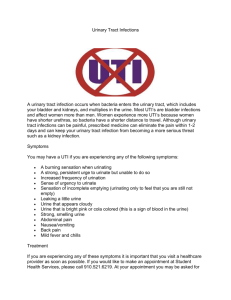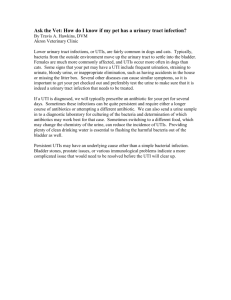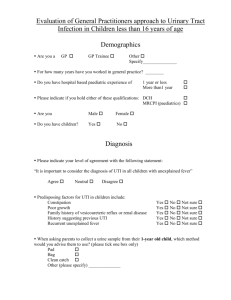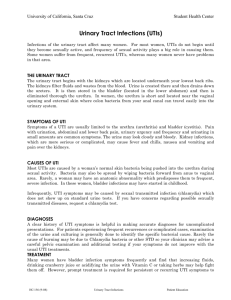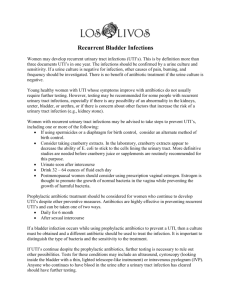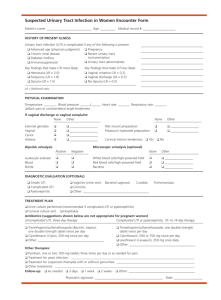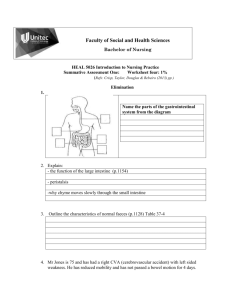URINARY TRACT INFECTION
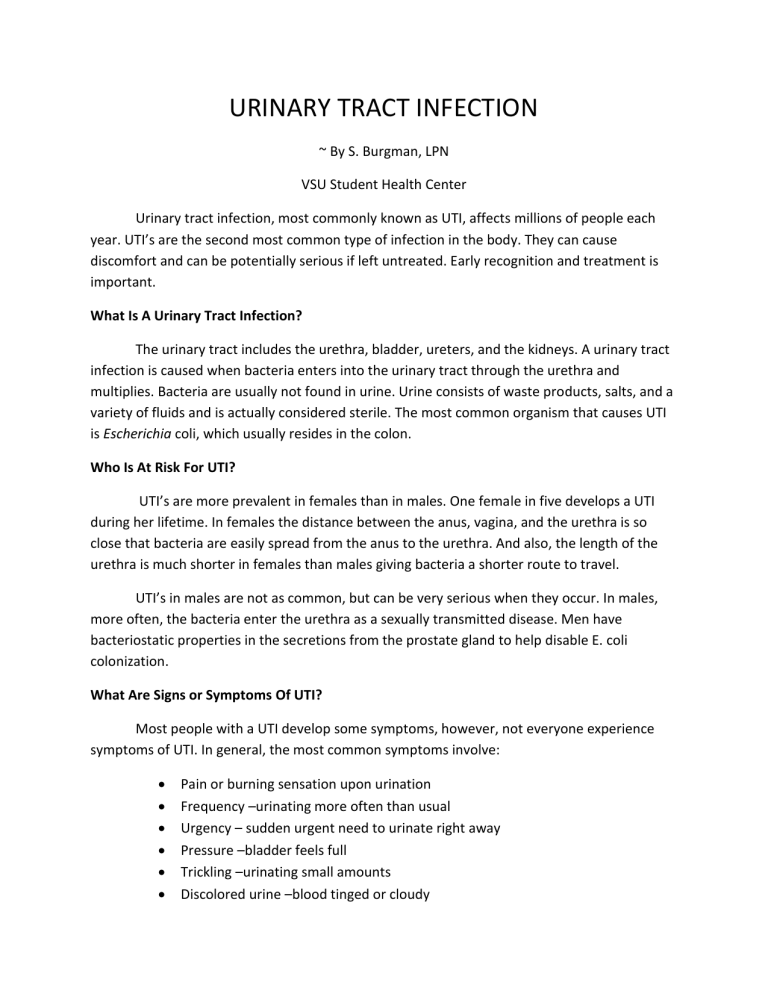
URINARY TRACT INFECTION
~ By S. Burgman, LPN
VSU Student Health Center
Urinary tract infection, most commonly known as UTI, affects millions of people each year. UTI’s are the second most common type of infection in the body. They can cause discomfort and can be potentially serious if left untreated. Early recognition and treatment is important.
What Is A Urinary Tract Infection?
The urinary tract includes the urethra, bladder, ureters, and the kidneys. A urinary tract infection is caused when bacteria enters into the urinary tract through the urethra and multiplies. Bacteria are usually not found in urine. Urine consists of waste products, salts, and a variety of fluids and is actually considered sterile. The most common organism that causes UTI is Escherichia coli, which usually resides in the colon.
Who Is At Risk For UTI?
UTI’s are more prevalent in females than in males. One female in five develops a UTI during her lifetime. In females the distance between the anus, vagina, and the urethra is so close that bacteria are easily spread from the anus to the urethra. And also, the length of the urethra is much shorter in females than males giving bacteria a shorter route to travel.
UTI’s in males are not as common, but can be very serious when they occur. In males, more often, the bacteria enter the urethra as a sexually transmitted disease. Men have bacteriostatic properties in the secretions from the prostate gland to help disable E. coli colonization.
What Are Signs or Symptoms Of UTI?
Most people with a UTI develop some symptoms, however, not everyone experience symptoms of UTI. In general, the most common symptoms involve:
Pain or burning sensation upon urination
Frequency –urinating more often than usual
Urgency – sudden urgent need to urinate right away
Pressure –bladder feels full
Trickling –urinating small amounts
Discolored urine –blood tinged or cloudy
Penile discharge
Lower abdominal pain
Malodorous urine
Lower back or flank pain
Fever
How Is UTI Treated?
Diagnosis of UTI can be made from symptoms alone or based on a urine analysis. In questionable cases a sample of urine is collected and sent to the lab for confirmation. A UTI always requires treatment. Routine UTI’s are treated with oral antibiotics. It is very important to complete the full course of treatment to prevent recurrence. Because symptoms may go away after the first few days of treatment many discontinue use and inevitably have to be retreated in the following next few weeks. Seek prompt medical care if you have any symptoms of UTI (listed above).
Tips To Avoid Urinary Tract Infections
These tips may help you avoid and relieve symptoms of UTI.
Drink plenty of water, cranberry juice, or blueberry juice to help flush out the urinary tract and to prevent bacteria from multiplying.
Avoid alcohol, caffeine, carbonated drinks, and spicy foods that may irritate the urinary tract.
Wash the genitalia daily, rinse well, and dry thoroughly.
Always wipe the genital area from front to back.
Avoid possible irritants such as douches, bubble baths with heavily perfumed soaps, feminine hygiene deodorant sprays, tight or constricting clothing, panties without cotton crotches, and prolonged wear of wet swimsuits.
Void promptly upon the urge to urinate.
Urinate before and after intercourse.
Reference:
Cunha, B., Tessier, J. & Vavaro, MD. (2009) Urinary tract infection, females.
Emedicine.medscape.com.
